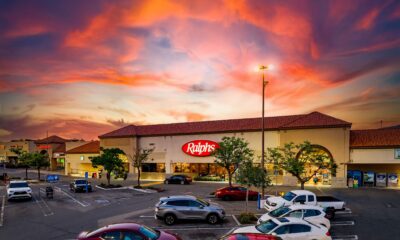Business
Pandemic Besieged Small Businesses Struggle to Reopen Across All Major Metros in California, But Vaccine Rollout Brightens Outlook

Small Business Revenues Scorched, Leisure and Hospitality Businesses Hit Hardest; Job Recovery Underway In Urban Centers
The number of ‘open’ small businesses in five of California’s largest metropolitan areas remains far below pre-pandemic levels – and has declined precipitously just since the surge in new COVID-19 cases hit the nation in late 2020, according to a new analysis released today by Beacon Economics.
As of early February, San Francisco has fared the worst with a 50.5% decline in the number of small businesses that are open and operating in the region compared to one year ago. Los Angeles has fared best with 34% fewer open small businesses, followed by San Diego (36.7%), the East Bay (37.2%), and the South Bay (40.3%). With the exception of Los Angeles, all metro regions performed worse than the state or nation as a whole where open small businesses have declined 35.4% and 34.2%, respectively.
In each region, steep drops in the number of open small businesses have occurred just since November when strict, health-mandated closures and restrictions were once again implemented following the largest surge in new COVID cases in the state to date.
“These latest findings underscore just how badly small businesses, and their ability to operate, have been curtailed by the pandemic and the ongoing restrictions on activity,” said Taner Osman, Research Manager at Beacon Economics. “However, with several effective vaccines rolling out in earnest, and with new virus cases falling across the state and nation, the outlook for small business is much brighter for the coming year.”
Osman notes that these data do not suggest that businesses that are not open have closed permanently, but the longer they remain closed, the greater the likelihood of that occurring. “How this ultimately plays out for individual businesses will depend on whether they have the resources to sustain themselves until things open up widely and permanently again,” said Osman. “The good news is that a sustained reopening is drawing closer and while we may not completely return to trend this year, the economy is on the path to full recovery, bringing small business with it.”
Revenues at small businesses have also been hammered, in many cases falling by close to or more than three-quarters compared to pre-pandemic levels. Key small business findings by region include:
- San Francisco Metro (SF and San Mateo Counties): Like elsewhere, San Francisco’s Leisure and Hospitality small businesses have suffered the most from pandemic-related restrictions. Regionally, there has been a 66.7% drop in the number of open small businesses in this industry compared to pre-COVID levels. Moreover, revenues at these businesses have taken a staggering 83.4% tumble. No other industry in San Francisco has come close to this level of revenue loss.
- Los Angeles Metro (Los Angeles-Long Beach-Glendale MD): While the data is brighter than in San Francisco, the number of open Leisure and Hospitality small businesses in Los Angeles has plummeted roughly 50% compared to pre-pandemic levels. This is approximately the same as in California as a whole. The loss of revenue at small Leisure and Hospitality businesses in Los Angeles stands at 68%, not as severe as the losses in San Francisco but still highly indicative of the harsh circumstances facing this industry.
- San Diego Metro (San Diego County): San Diego’s Leisure and Hospitality small businesses also stand out as the most severely affected by the pandemic. The number of open small businesses in this beleaguered industry has fallen 47.7% compared to pre-COVID levels. This is a better outcome than in the state or nation as a whole, reflecting the relative strength of the region’s economy at the outset of the crisis. Although acute, at 66.2%, there has also been less revenue loss among San Diego’s Leisure and Hospitality businesses than in any other metro.
- South Bay (Santa Clara and San Benito Counties): Unlike every other metro, in the South Bay, small businesses in the Transportation sector have fared the worst with 47.7% fewer open compared to pre-pandemic levels. Leisure and Hospitality small businesses are not far behind, however, with 45.8% fewer open. Revenues among the latter have also been hit the hardest, by far. As of February 2021, Leisure and Hospitality small businesses in the South Bay have suffered a 72.7% drop in revenue.
- East Bay (Alameda and Contra Costa Counties): In the East Bay, Leisure and Hospitality small businesses have experienced the most severe impacts with a 59.4% drop in the number of open businesses compared to pre-pandemic levels. Only San Francisco has experienced a steeper decline. Accordingly, revenues have fallen 72% at East Bay small businesses in this industry. No other sector in the region comes close to this level of revenue loss.
The new analysis also finds that employment gains are occurring across all the state’s major metros, but each still has significantly fewer jobs compared to pre-pandemic levels – ranging from 7.3% fewer jobs in the South Bay to 10.4% fewer jobs in San Francisco. Unemployment has continued to fall across all metro areas of the state.
View the full Regional Outlooks for the East Bay, Los Angeles, San Diego, San Francisco, and the South Bay here:
Business
Sweet Success: The Inland Empire Regional Chamber of Commerce Teams with The Freaky Cookie to Elevate Local WBENC-Certified Business
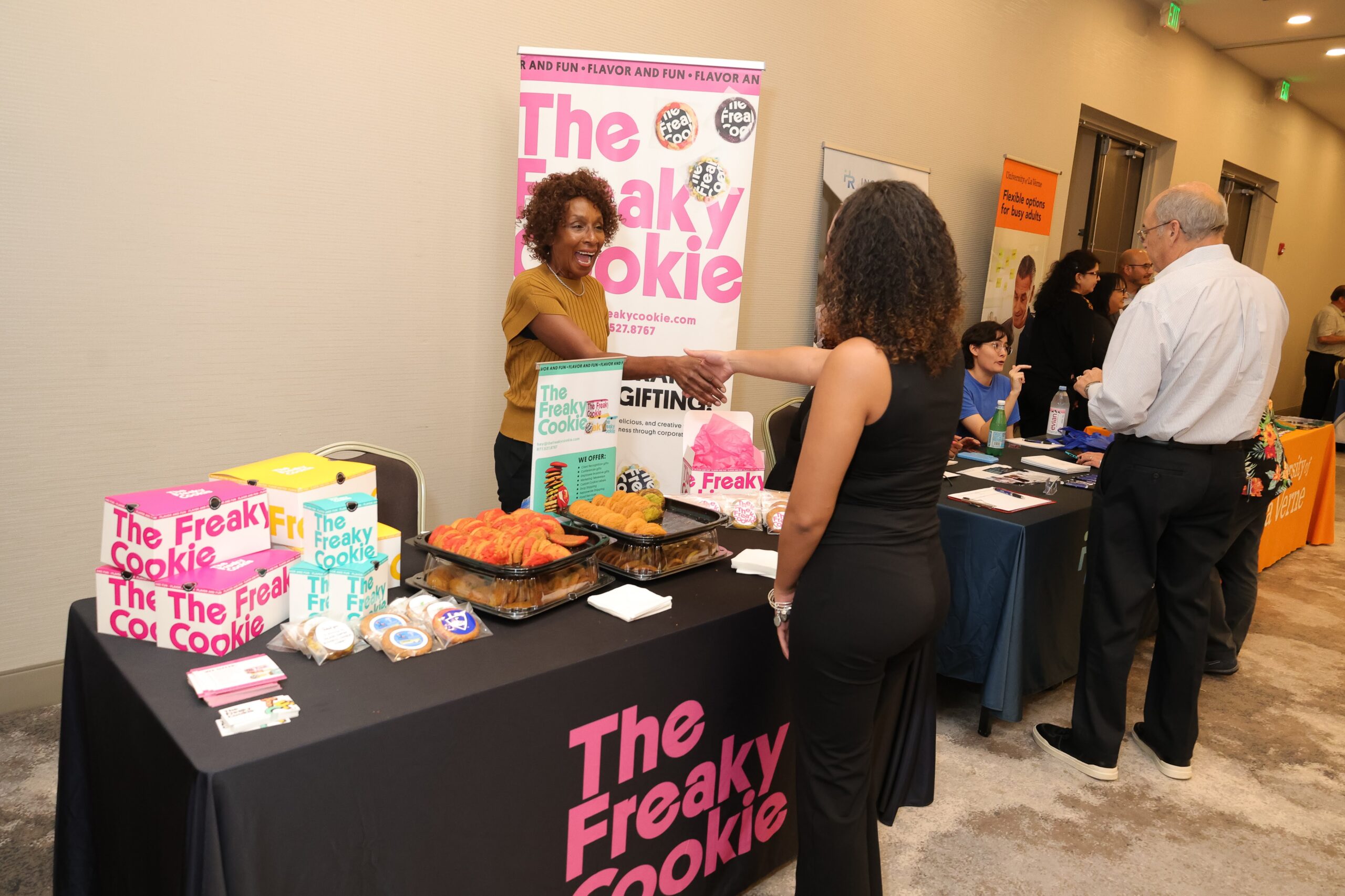
How The Freaky Cookie Grew with Chamber Support: A WBENC Success Story in the Inland Empire
At the Inland Empire Regional Chamber of Commerce (IERCC), we pride ourselves on championing business growth and recognizing the powerful stories of our members. One standout example is Sheila Cavalier, founder of The Freaky Cookie—a fun and rebellious cookie catering company she launched in 2018 alongside her son, Marcus.

What began as a direct-to-consumer venture has grown into a business-to-business powerhouse, fueled by innovation, strategy, and strong community ties. The Freaky Cookie specializes in custom-labeled, individually wrapped cookies for corporate gifts, bulk orders, and special events. Their nostalgic family recipe, dating back over 90 years, delivers both flavor and flair. As Cavalier puts it, “There’s never not a need for a large amount of cookies.”
Recognizing a unique market opportunity during the pandemic, Sheila pivoted the business model to focus on custom-branded cookies—meeting the surge in demand for individually packaged baked goods that also serve as creative marketing tools. “Corporations were tired of traditional marketing,” she recalls. “Our custom-labeled cookies became a fun, fresh alternative.”
In 2022, Sheila connected with IERCC President Edward Ornelas Jr. during the Multi-Chamber Mixer at Ontario International Airport. That meeting led to The Freaky Cookie joining IERCC, which soon opened doors to strategic partnerships and increased visibility. Through the chamber’s vast network and advocacy, Sheila has built relationships with organizations such as Bank of America, Fifth Third Bank, Top Golf, and Southwest Airlines, which featured The Freaky Cookie in their 50th Anniversary celebration at ONT.
“The IERCC has been a warm and welcoming space,” Cavalier said. “Having the chamber validate our business really means something. It’s helped us get our foot in the door with so many great companies.”
The impact has been tangible. With increased revenue and expanded operations, The Freaky Cookie is no longer just a clever name—it’s a growing force in regional commerce. As Sheila puts it, her goal now is simple but powerful: “Deliver smiles.”
Business
Fire Helmet Manufacturer Helps Disabled Community find Employment

Riverside’s Phenix Technology Leads with Inclusion, Empowering the Disabled Community Through Workforce Training and Employer Education
Written by Logan Rosselli, IEBJ Content Contributor
In the heart of Riverside, off of Chicago Avenue, a small, but mighty team has been quietly manufacturing life-saving equipment for firefighters across the world for over 50 years. Phenix Technology Inc. is an internationally recognized fire helmet manufacturer who builds their products from start to finish right here in the Inland Empire. For their great products, they’ve received numerous awards such as the Greater Riverside Chamber of Commerce’s 2025 Innovator of the Year, a 2016 “E” for Exports award from the U.S. Department of Commerce, a finalist position in the “Coolest Thing Made in California” competition and more. However, their most recent accolade doesn’t involve their products at all.
In 2024, Phenix founded the ground breaking “Opportunity for All” program to provide disabled community members with the opportunity to access career education, hands-on experience and employment opportunities through an 11 week training cohort. In this program, neurodivergent individuals wanting to find stable employment learn about standard hiring practices, writing a resume, effective interviewing and professional attire while getting on-the-job training with a partnered employer in the community. It has helped dozens of disabled community members to find a new sense of independence and achieve their full potential while helping local employers find dependable employees who bring a unique perspective to the workplace.
It’s for this program that the National Association of Workforce Development Boards (NAWB), a representative of over 570 workforce development boards across the United States, honored Phenix with the prestigious W.O. Lawton Business Leadership Award in late March.
“While we take tremendous pride in the products we make, we also believe we have a mission to create a better world through developing opportunities,” said Angel Sanchez, CEO of Phenix Technology in a statement released in early April. “Opportunity for All has helped prove that individuals who have historically been excluded from the workforce don’t just contribute — they elevate organizations. We are honored to receive this national award and grateful to the partners who have helped us make this vision a reality.”

CEO Angel Sanchez Jr. accepts the NAWB Award
Though “Opportunity for All” is certainly the cornerstone program for the company, Phenix’s leadership team was not satisfied to leave their mission there. Thus, in 2024, the company founded its nonprofit arm, Phenix Gateway to offer more programs and advocacy to the community. Through Phenix Gateway, the company offers workforce development workshops for individuals who don’t need the full scale of the “Opportunity for All” program, but want to improve a specific skill like resume writing or workplace social skills.
However, Phenix knows that preparing disabled people for the workforce is only one end of the equation; the workforce also has to be prepared to accept the unique skills, perspectives and challenges of the disabled community. For this reason, Phenix Gateway offers employer training workshops as well as educational materials available to businesses and the community. Training programs cover a lot of ground, ranging from assistance with optimizing interviews for people with neurodevelopmental disorders to creating sensory-friendly environments in the workplace.
In Riverside, these programs have had a huge impact on the local community. As of March 2025, Phenix’s Opportunity for All program has had over two dozen participants and 44% found stable employment through or after the program. Their one-off workforce development workshops have seen over 200 participants learn new skills and help them find employment and the nonprofit currently partners with close to 90 businesses to assist them in their endeavor to create a more inclusive workforce.

Phenix Gateway staff helps a program participant with his skills
For businesses or community members interested in learning how they can support or participate in these programs, Phenix encourages them to reach out by email to info@phenixgateway.org and to attend their First Annual Gala: Rising Together, A Phenix Gateway Celebration, on Thursday, May 15th. Tickets for this event are available at phenixgateway.org.
Business
Supported by Local Leaders, CALED’s Annual Conference will be in Ontario this May

Empowering Economic Growth: CALED Conference Set to Unite Industry Leaders in Ontario
CALED’s ‘Growing Local Economies from the Ground Up’ Conference is being held in Ontario at the DoubleTree by Hilton Hotel Ontario Airport on May 7-9. This event is co-hosted by the City of Ontario and San Bernardino County, with Jennifer McLain Hiramoto, CALED’s Chair of the Board and Derek Armstrong respectively representing their city and county as Co-Chairs of the event.
With over 950 members and 45 years of empowering economic developers, CALED is the largest economic development association in the country and the annual conference is the number one place to meet and connect with the boots-on-the -ground, decision makers in our communities.
The conference will include a pre-conference teaching tour, ‘Building & Paying for Development Projects’ on May 6th and then begin in full on May 7th, with a welcome session and breakouts. Overall, there will be four general assembly sessions and 18 breakout sessions, which will delve into local economic development practices and innovative tools.
In addition to compelling content, the conference will have numerous opportunities to connect with community leaders and valued peers through networking receptions, the culinary crawl, and new this year, the Tournament of Champions, where conference attendees will navigate a gauntlet of games to win the grand prize on the evening of Thursday, May 8th.
To learn more about the conference and register, visit the CALED website at www.caled.org.
-
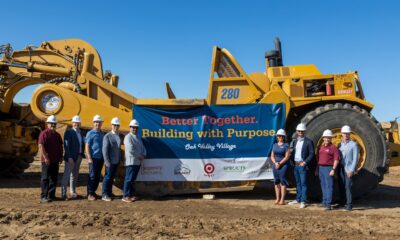
 Bizz Buzz3 months ago
Bizz Buzz3 months agoRegency Centers Unveils Oak Valley Village: A New Retail Hub Coming to Beaumont, CA
-

 Technology4 months ago
Technology4 months agoLA Tech Week Highlights Southern California’s Expanding Tech Ecosystem
-

 Entertainment4 months ago
Entertainment4 months agoROI: Return on Insanity—Lucha VaVoom’s High-Yield Investment in the Pomona Arts Colony
-
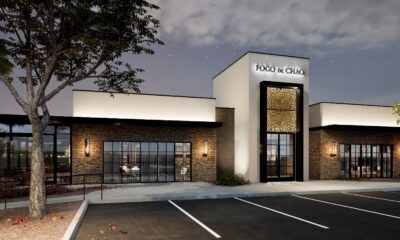
 Food & Lifestyle5 months ago
Food & Lifestyle5 months agoFogo de Chão Heats Up Rancho Cucamonga Dining Scene
-
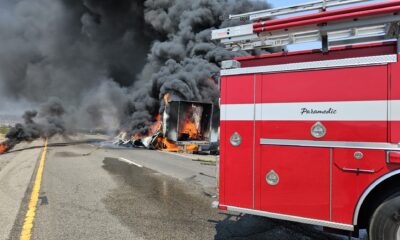
 Transportation3 months ago
Transportation3 months agoRegional Leaders Launch “Coalition for Our Future” to Advance Urgent Safety Solutions for I-15 Corridor
-

 Travel & Tourism3 months ago
Travel & Tourism3 months agoFly Ontario, Calif., to Honolulu aboard Southwest Airlines starting in June






